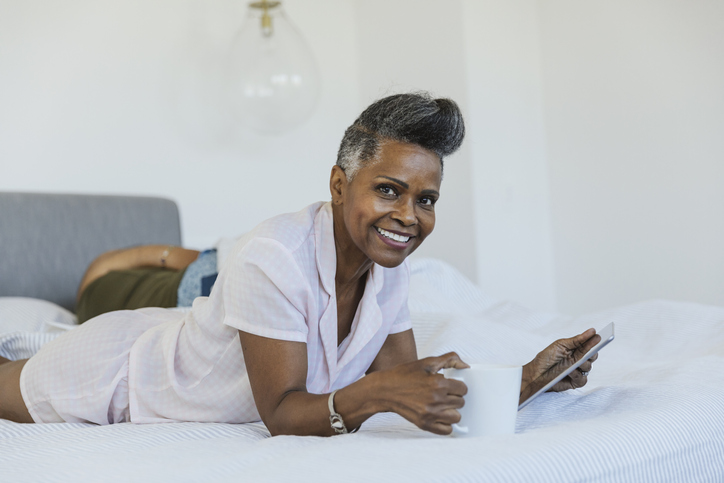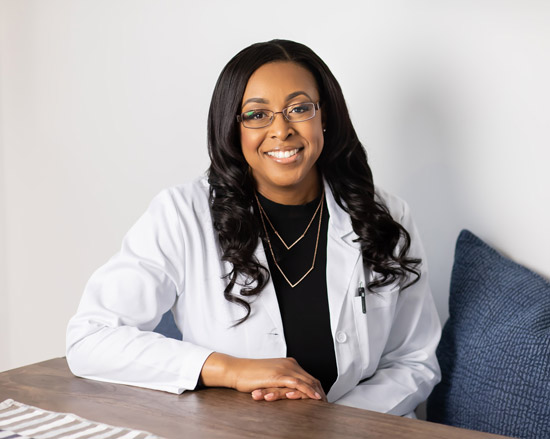
Source: The Good Brigade / Getty
October is Menopause Awareness Month. And with all the shame and secrecy associated with menopause, it’s time we talk about it. So to help us to prepare for what will inevitably come for us all, we spoke to Dr. Brandye Wilson-Manigat, an OB-GYN, about what to expect, how you can make menopause manageable, and embracing this period of your life.
MadameNoire: Why do you think women don’t talk about menopause? What is the shame surrounding that topic?
Dr. Brandye Wilson-Manigat: I think it’s around aging, honestly. It’s the idea that if you are an older woman, and you lose your reproductive ability, you’re no longer fully a woman. So I think it’s the stigma around aging.
MN: What are the physical and psychological signs women should be prepared for when it comes to menopause?
Dr. Brandye: I think one of the first signs is fatigue, which is something women don’t necessarily think of. They just think they’re super busy and tired from doing life. There are also the typical things. The hot flashes, being more irritable is pretty common.
And depending on the woman, there may be vaginal dryness. Some women come in and say, ‘My vagina is dry. It’s not doing what it needs to do.’ Then other women are like, ‘No, I’m fine but these hot flashes and night sweats are killing me.’
Psychologically, women are more prone to getting depressed and having symptoms of anxiety around this time. It’s been described as a reverse puberty. When you go through puberty, you go through all these ups and downs. Your emotions are all over the place. Same stuff can happen when you go through menopause and through that transition.
MN: There is a lot of fear for younger women about possibly going through early menopause. What are some signs that may be happening?
Brandye: It’s hard to say because a lot of the signs can point to other things. Like period changes. You start having less frequent periods, they may get shorter, or lighter. But that’s something that can just happen over time. There are fluctuations that happen in the hormones. It’s hard to say, ‘These are the symptoms.’ The biggest thing would be if you are noticing hot flashes and those changes in your period together. Because the hot flashes are the sign that your estrogen levels are dipping and there’s a change in the physiological workings of your body. But that being said, you have to be cautious of that because 25% of women will have hot flashes and it has nothing to do with menopause or estrogen, you just have them.
MN: Is there any danger in going through early menopause?
Brandye: Oh yes. With the transition into menopause, there is a subsequent increase of heart disease. So, if you’re going through early menopause then that risk is compounded. So you want to monitor your diet, check your cholesterol and make sure you’re doing all the heart healthy stuff to hopefully stave off any cardiovascular disease.
There are also issues with bone health because your bones are built by estrogen. You reach your peak of bone building when you’re about thirty. It still will build some after that but the bulk of your bone density is built up until the age of 30. So if you then go into menopause after that, you’re at higher risk for osteoporosis and fractures.
MN: Are there any factors that can contribute to early menopause or is this something that is genetic?
Brandye: There are conditions that can lead to early menopause like Turner’s Syndrome, which is a chromosomal abnormality. But then there are people who just go through it and we don’t have a reason for why.
MN: What are the things women can do to make menopause more manageable?
Dr. Brandye: It kind of makes life sucky but alcohol is a trigger for hot flashes. So decrease your intake of alcohol. Cigarettes smoking—which we don’t recommend you do anyway—is also a trigger. Stress. You have to get your stress under control because they will make the hot flashes worse. Then manage the temperature in your environment. If you’re in a hot environment, you’re more likely to have hot flashes. So stay cool, layer clothes if you’re in an office. Take stuff off, put stuff back on when you get cold.
You can take supplements can help in terms of your mood. Vitamin D is one of those great supplements we want you to take. It helps with cardiovascular health, colon cancer, but it also helps with depression and anxiety too. Magnesium is great. That will help with sleep. Not being able to go to sleep or stay asleep is a big issue during menopause.
In terms of vaginal dryness, you can include more omega fatty acids in your diet because those go into the body’s production or lubricate so that you are not experiencing severe dryness.
If your symptoms are severe and inhibiting your day-to-day life, we discuss other alternatives like hormone therapy to treat the symptoms. We do it for a short time, with the smallest dose as possible. And for some women, that’s all that works for them.
MN: Once menopause starts, is it a constant state or do you go through menopause and then it’s over.
Dr. Brandye: No. Once you’re in it—once you have those 12 consecutive months of no period—then you’re just in menopause. It’s not something that you’re in for five years and then you pop out of it. No. But the hot flashes generally last for a finite period of time. They can start from the time of your last period and then last for up to five years after. Some women will continue to have hot flashes throughout their whole life, but it’s not intense by any stretch. They may have one or two, here and there as opposed to five or six, throughout the course of the day.
MN: Is menopause something women should dread? It sounds horrible but is it something women should be dragging their feet about or should we embrace it?
Dr. Brandye: I think perspective always has a big impact on how we go through things. So definitely have a positive attitude about it. Actually, menopause can be a pretty freeing time because it usually is a time where women have gotten to know themselves, by then. They know what they want. They know what feels good, what doesn’t feel good. They are secure enough in themselves to speak up for the things that they want. Menopause can be a great time as long as you’re able to manage your symptoms appropriately and have appropriate expectations.
With the work that I do with women, they’re coming to me saying, ‘I’m in menopause and I don’t want to have sex because it hurts.’ And I’m like, ‘Okay, let’s help you.’ They’ll say my desire is gone. I don’t want to.’ That’s not a hallmark of menopause but let’s get you having some fun, let’s get you enjoying things and having some good times. You can use some of these lubricants and make it happen!
It can be a really great time. You don’t have to worry about getting pregnant. You still have to think about STIs. I’m always telling my older ladies, use your condoms. But I think it’s a very freeing time and a time to embrace who you are.

Source: https://drbrandyemd.com/ / Dr. Brandye Wilson-Manigat
Dr. Brandye Wilson-Manigat is a board certified obstetrician and gynecologist, highly sought-after speaker, and women’s sex and libido coach. You can learn more about her practice and work, here.









